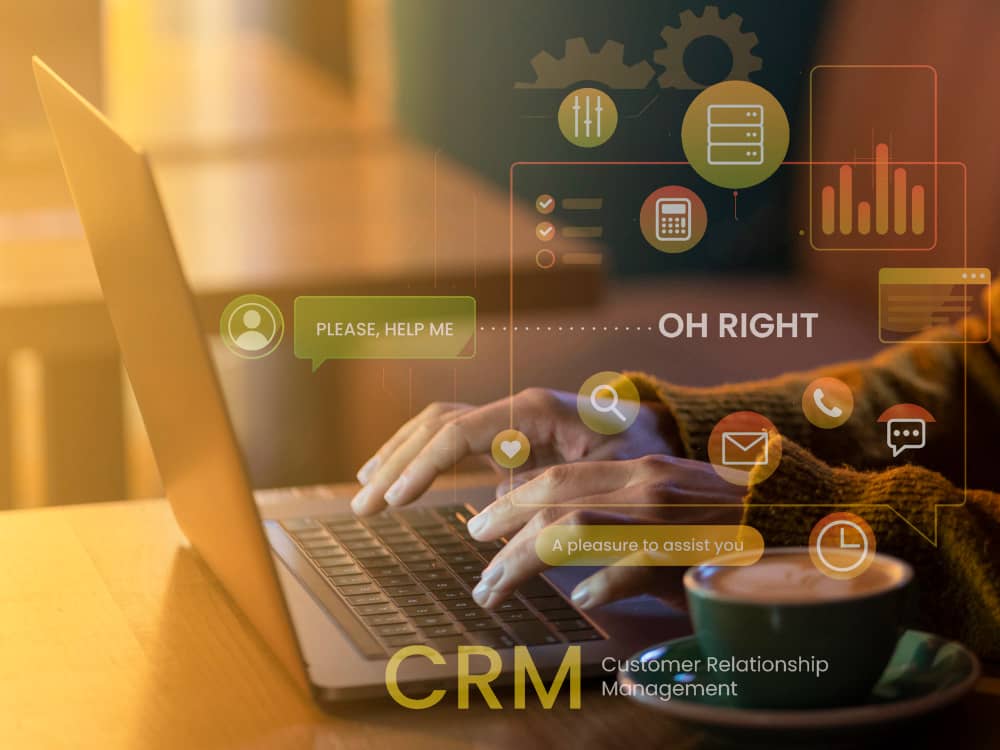Customer relationship management software, known as CRM (Customer Relationship Management), has become an essential tool for businesses today. The goal of CRM is to help companies manage and analyze customer relationships throughout their lifecycle, from first contact to long-term customer relationship maintenance. Below, we discuss what CRM software is, how it is used, the different types of CRM software, and how it helps businesses grow and differentiate themselves.
What is CRM Software?
CRM software is a system that collects, stores, and analyzes customer data. Its main components include contact management, sales pipeline tracking, marketing automation, and customer support management. For example, Microsoft Dynamics 365 CRM allows companies to track customer interactions, sales progress, and customer service history, helping to prevent data loss from employee turnover, among other things. In addition, such data is valuable for understanding customer needs and providing personalized service so that each customer feels special and remembered.
What is CRM Used For?
CRM is used in various business processes to improve business efficiency and customer experience. Although there are different CRMs available on the market for each department, it is best to use one tool that suits all the necessary parties to minimize data duplication and ensure that the data collected for each customer is all in one place.
The main areas that businesses use CRM are:
- Sales Management: CRM allows sales teams to manage leads and track the sales pipeline. For example, Pipedrive’s CRM allows sales teams to visually track the progress of deals and plan their next steps. The sales department can input all contacts into the CRM along with various notes. For example, they can plan who to call or write to and decide when and in what order to do so. You can also monitor the sales process by adding the necessary notes and statuses to each contact (called/offer sent/purchase completed, etc.). It is essential to meticulously record important customer information in the customer management system, including details such as their birthday and even the name of their dog. This is necessary to know how to approach the client and to be able to instantly talk about important topics when communicating with them.
- Customer support and communication: LiveAgent, for example, is one of the CRM software that helps focus on customer support management, enabling businesses to track and resolve customer inquiries efficiently. This improves the customer experience and increases customer loyalty. For example, suppose customer support needs to further investigate the client’s concerns, but they can only provide answers in a few days. In this case, CRM enables you to schedule reminders to respond to the customer, ensuring that you don’t forget. CRM can also be used to quickly analyze aspects about which customers have had more questions. It provides valuable information, for example, to improve your product.
- Marketing and campaigns: CRM software can be integrated with marketing platforms to personalize campaigns and automate marketing activities. This helps to target the right customers and increase the effectiveness of your campaigns. By knowing which products the customer has bought in the past, you can make offers to the customer according to their interests.
- Data Analysis and Reporting: CRMs collect and analyze customer data that helps businesses make data-driven decisions. For example, Excellent CRM allows you to generate detailed reports on sales trends and customer behavior. In addition, past data will enable you to predict the market situation, make sales projections, etc., because all the data for this purpose is neatly collected in the software.
Depending on the business field, CRM can also be useful in other areas, such as inventory planning and personnel recruitment. It’s important for every business to consider the critical information needed to make decisions and to ensure the flow of information between departments.
Different Types of CRM Software
CRM software is divided into two according to their storage location: cloud-based and on-premise systems. Both of them have their advantages and disadvantages:
- Cloud-based CRMs: Solutions like Pipedrive and LiveAgent offer flexibility and real-time access. Cloud-based CRMs are usually easier to set up and manage because they don’t require special hardware or IT infrastructure. These solutions are well-suited for small and medium-sized businesses that want quick deployment and worry-free maintenance.
- On-premise CRMs: These systems are installed on the company’s own servers, which gives more control over data processing and security. On-premise CRM software is often more complex and requires a higher initial investment, but it offers greater customization and integration options with existing systems.
In addition, CRM software is mainly divided into three categories according to functionality: operational CRM, analytical CRM, and collaborative CRM. Let’s take a closer look at what sets them apart:
- Operational CRM focuses on day-to-day activities such as sales, marketing, and customer support. It automates and optimizes customer communication and service processes by providing tools to manage the sales pipeline, campaigns, and customer inquiries. With this type of CRM, you can typically manage customer tickets, create tickets for IT, track sales pipeline or customer projects, etc. These types of CRMs aim to provide the best service to customers.
- Analytical CRM is focused on data analysis, which involves collecting and analyzing customer data. It aims to give a business a deeper understanding of customer behavior and preferences to make data-driven decisions and personalize the customer experience. The purpose of analytical CRMs is to make data analysis more understandable, even for a simple user. Usually, a vast amount of data is collected in one company, and it is tough to search for connections between them in Excel. Analytical CRM makes work here much easier.
- Collaborative CRM facilitates information sharing between different departments of the company and business partners. We know that teamwork is critical to achieving good marketing results. Collaborative CRM focuses on improving customer engagement through effective collaboration and communication by providing tools such as shared calendars, project management, and communication platforms. For example, if a client’s project includes IT development, design, and marketing, a collaborative CRM informs all parties about the project and helps it be completed successfully.

How Does CRM Help Grow Your Business?
The use of CRM software brings advantages to the company in several areas:
- Improving customer relationships: CRM allows companies to provide personalized service that improves customer satisfaction and increases loyalty. For example, CRM software helps consolidate a customer’s entire communication history in one place, allowing customer service to provide more accurate and faster assistance. It also helps to avoid a situation where you simply forget to send a reply to the customer.
- Optimizing the sales process: CRM helps sales teams track the progress of deals and identify potential bottlenecks in the sales process. This way, sales teams can focus on the most valuable leads and increase conversion rates. CRM also helps keep all the information related to the potential customer in one place to make a smartly prepared personal offer to the customer.
- Data-driven decisions: CRMs collect extensive data on customer behavior and preferences. This data is valuable for making data-driven decisions, developing new products and services, and optimizing marketing campaigns. Each business department often seems to have a strong opinion about what needs to be done next in the industry. Making business decisions is also much easier if all data is always adequately recorded and measurable.
- Marketing efficiency: CRM allows marketing teams to create targeted campaigns and track their performance. This gives you a much better insight into which ads and channels are working. Personalized and targeted marketing helps to increase customer engagement and conversions, as thanks to a larger amount of information about customers, more precise segments can be created and content more relevant to the customer can be created.
By using the right data in the right place, it is much easier for the company to make business decisions, the cooperation between departments is easier, and the risk of data loss is lower.
How to Choose CRM Software?
Choosing CRM software is a strategic decision that can have a significant impact on a company’s efficiency and customer relationship management. Here are some important steps and considerations to help you make the right choice:
- Determine your needs and goals: Which features are most important to your business? Do you focus, for example, on sales management, customer service, marketing, or instead on analytics? When making a decision, listen to the business needs of all departments and map them. This part of the process can take several months.
- Choose the type of software: What kind of CRM software do you need – operational, analytical, or collaborative CRM? The choice should be based on the specific needs and processes of the company (from the previous step). Also, decide whether you need a cloud-based CRM that offers flexibility and real-time access or an on-premises solution that provides greater control over data. Cloud-based solutions like Pipedrive and LiveAgent are often faster to deploy, easier to manage, and more affordable. However, in the case of huge corporations, their capabilities may be lacking, and unique solutions developed specifically for one company may be needed.
- User-friendliness: Choose software that is intuitive and easy to use. A good user interface will help ensure that your team quickly adopts and uses CRM effectively. Let’s be honest – letting expensive software just sit there “in the drawer” doesn’t make sense. Instead, it must become a daily working tool for employees.
- Integration options: Check if the CRM integrates with existing tools and systems, such as email marketing platforms, accounting software, and customer support systems. Making the systems “talk” to each other improves data flow and efficiency and thus significantly reduces human time.
- Scalability and adaptability: Make sure the CRM can grow with the business and adapt to changing needs. Think ahead to where you see your company in a few years, and ensure that the software you choose can handle the increased demands. Customization enables you to tailor the software to align with your specific work processes. For example, determine whether the chosen CRM can integrate with your existing software.
- Cost and Budget: Consider that the software will cost you some money, and ensure it will fit your budget over the long term. Adopting a CRM is a long-term investment as it takes several months to implement. Find out if the software has a one-time license fee and periodic renewal fees or if it’s a monthly payment software. The price of CRM software can range from $12-$500 per month per user, depending on how extensive the software is.
- Support and Training: What technical support and training options does the desired software offer? A good CRM vendor offers support to help you implement the software and train your team.
- User Experiences and Reviews: Explore other companies’ experiences with the same software. User experiences and independent reviews can provide valuable information about the software’s strengths and weaknesses.
- Free Trial: Many CRM software offer free trials. Use this opportunity to test the software in a real environment and ensure it meets your expectations and needs.
Differences in CRM Software
Different CRM software have their own unique features and benefits. For example:
- Pipedrive focuses on sales pipeline management and offers an intuitive visual interface ideal for sales teams. The software has built-in email capabilities and good analytics. Read more: https://www.pipedrive.com/
- LiveAgent emphasizes customer support and communication management, offering a wide range of integration options and customizability. It is best suited for businesses that need to manage customer support tickets. Read more: https://www.liveagent.com/
- Standard Books offers comprehensive functionality for contact management and workflow automation, focusing on larger companies that require more complex solutions. It is an economic software with CRM built into it. Read more: https://www.excellent.ee/en/standard-books-2/
- Noom CRM: Increases sales results and improves customer service by providing features such as contact management and sales pipeline tracking. Their main strengths are the administration of customer cards and the creation of a calendar system (for example, for sports clubs). Read more: https://astrobaltics.eu/en/noom/
- Oixio Digital helps companies digitize data and thereby make it available. Their goal is to help companies take their sales, marketing, and service processes to a new level by offering customizable and integrable CRM solutions. Read more: Read more: https://oixio.eu/digital/
- GetUku is a work management software that offers a CRM solution specially tailored for accountants. The software allows you to manage customer data and history in one place, save time when sending emails, and ensure the accuracy and availability of customer data. Read more: https://getuku.com/

The Use of CRM Software for Your Business: In Conclusion
CRM software is an essential tool for businesses to help manage customer relationships and improve business processes. Choosing the right CRM depends on your company’s needs, budget, and strategic goals. When choosing the right software, remember to consider the needs of all parties and find the best tool accordingly. Regardless of the solution you choose, CRM software helps you improve the customer experience, optimize the sales process, and make data-driven decisions that help your business grow and compete in the marketplace.
